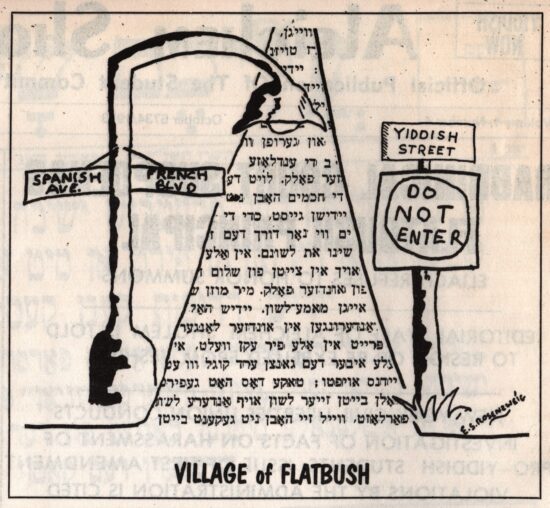◊

by Aleichem Sholem staff member (and art director) Eli S. Rosenzweig (from issue no. 4, p. 2, 1974)
◊
Preface
In the 1970s, one could still hear an older set of reasonings for the boycott of the study of Yiddish in any American Jewish (/Hebrew) day school: “It’s a primitive ghetto-mentality (and not very nice sounding) galut language (or corrupt jargon) good for the Communists and the Hasidim and those who hate Hebrew and Israel. It would be ridiculous to include it, especially now that it’s a completely dead language.” Nowadays one hears delicatized, politer reformulations of the foregoing, plus less polemic explanations: “It would just be too much on top of English, Hebrew, and one of the major foreign languages. Sorry, it’s a curriculum issue, there’s no time.”
Looking back at Aleichem Sholem, from my high school years (ages 15-18), I am delighted to report that in Nov. 2004, I had a wonderful evening of peace, reconciliation, humor and “speaking only Yiddish as a matter of principle, at the insistence of the hosts” at the Manhattan high rise apartment of Rabbi David Eliach and Dr. Yaffa Eliach at their gracious invitation when I was in New York that month for the publication of Words on Fire: The Unfinished Story of Yiddish. On a much sadder note, and with lifelong feelings of some indirect guilt: our beloved Talmud teacher Rabbi Oscar (Yechezkal) Lichtman, the school’s major embodiment of East European style Talmudic study (he had studied with the legendary Rabbi Aaron Kotler) was fired once our class graduated, some time had gone by and the issues were out of the public eye, and told it was because of his support for “the Yiddish.” He relocated to Chicago to start a yeshiva there, and passed away in 2007.
The materials below are being collected not only in the interests of those who will fairly study these often misunderstood events of the early 1970s in New York. This little project is dedicated to a long overdue twenty-first century fulsome, serious, proud and successful introduction of Yiddish studies into the curriculum of the American (and international) Hebrew and Jewish day school movement, which can only be enriched and enhanced by enabling hundreds of thousands of pupils to know the language of their own recent ancestors, of a great world literature and of the unique and vast heritage of East European Ashkenazic Jewry.
◊
-
-
-
-
-
-
-
-
- A 1975 letter writing campaign to principals of major Hebrew day schools resulted in one sympathetic letter, from Dr. Abraham Zuroff of BTA (Brooklyn Talmudical Academy = Yeshivah University High School for Boys). See 2014 obituary for Dr. A. Zuroff. Question: Does the successor school include Yiddish in the third decade of the 21st century?
